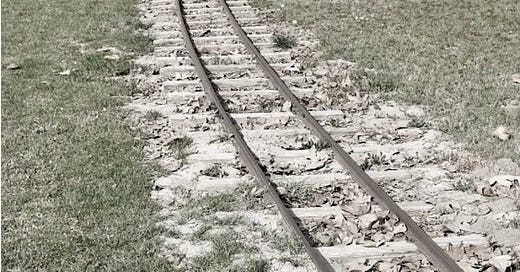My Only Glory
The train was made to work. Uncle Henry sat in the gap between engine and carriage, ran the diesel engine, and the train chugged round and round the field. Daniel, in Maggie’s lap, leaned over and sunk his teeth into the car’s wooden edge and, looking down, watched the tracks as the train jounced along. The three laughed a lot. Soon other kids stopped by, begging for a ride. Someone from the next town drove over and brought his little girl who rode around with her silent mouth wide open. The barn and field became something of a local gathering place. Kids were devoted to the two Belgians, particularly a female “horse-phase” gang, whose members ignored the makeshift railroad, each girl taking her turn standing on a stool to elaborately braid Leo or Tod’s mane. Happiness woven iridescent by the summer damselflies filled Henry’s days. On weekends Maggie would bring Daniel over with Claude—momentarily stunning Henry, as if he had forgotten her husband existed—but he used the sound of the brass train bell ringing, the sight of the tanned, lithe limbs of his charges all akimbo as they piled in behind the engine as blinders, and it was too easy during these times not to face facts, too easy to ignore that one particular fact that any misstep would land him deep in the abyss of envy and despair. He believed in the power of his dreams.
But those dreams were his high-water mark. He never did kiss Maggie, although he might have on one or two occasions had he risked it. Come September, a month he always hated with its hard blue skies, the humidity lifted and most of his riders vanished back inside their schools. Then the weather turned nasty; it rained for days and Henry did not see Maggie or Daniel for over a week. When the sun re-emerged and the sky became a still blue bowl once more, the pair did not reappear. Henry walked over to the Nelsons’ house and stood on the opposite side of the street, waiting for he wasn’t sure what, but there was no movement within that he could perceive. He got his answer at the post office a few days later when he overheard the Miller sisters talking about the Nelsons, Irene saying with a knowing air that the boy was in Saint Luke’s ‘for God knows what,’ as if to say, for those like Daniel, suffering was his lot and the way of the world, and she understood that.
My uncle walked every day past the Nelsons’ house hoping to somehow discern some kind of reason, to distill information from the thin air if need be, until one day some months later the answer came in the form of a For Sale sign planted startlingly upright in the Nelson’s lawn, stark and bleak in the ice and snow. Daniel had died over Christmas and the Nelsons were fleeing their memories.
Henry retreated to his shed and stayed there a good part of the winter even though it had no heat; he most assuredly drank heavily. My father went several times to talk to him, Dad’s face on returning dark and troubled; he never spoke of these visits to us. When Uncle Henry emerged from his shed, he came out a different person. My uncle was strong from working the fields—athletic and strong—and had always seemed to me like some old growth vine, all gnarly and hard and producing the best wine they all said, but his sorrow changed that. When I saw him next the only image conjured was one of rubble—void of action or will.
The kids still wanted to ride the train, and sometimes he’d accommodate them, sometimes there’d be no answer to the small knock on the shed door. The barn became verboten territory for children of the more suspicious and anxious parents in town, though most snuck in there with their friends anyway. Leo was put down due to old age and was replaced with a smaller, dapple grey mare, Marisa. Sometimes I’d look at my uncle as he watched the kids in the barn with Marisa and Tod, and the look in his eyes made me advert my gaze as if I was spying on something sacred, and there’d be a catch in my throat and a pain in my chest. He remained in limbo until the summer I graduated high school. Then he heard she had left Claude and later married someone else and he stopped running the train.
Maggie, Maggie, Maggie . . . my love, my train, my only glory, he would think over and over and over. When he died from holding on for far too long, the train was left standing in the field in the rain, then the snow, then the sun, the grass growing between the rails, the dark metal of the engine powdered with dirt, and rust, and bird droppings until it all stood desecrated, all love long gone, emanating a despair so solid and so steady that people would walk by that field quickly, never stopping, and kids would dare one another to run over and touch the engine, then run away again, because it was “spooked.”
Image: The power of dreams. Source: By Northwalker (Own work) [CC0], via Wikimedia Commons, edited by J. Weigley



